This post is from Grown and Flown.
by Lisa Damour | Estimated Reading Time: 3-4 minutes
Psychologists have spent decades researching and treating both stress and anxiety. In fact, we understand these two phenomena as well as we understand anything in our field. But we haven’t always reached beyond our classrooms and clinical practices to share the science behind stress and anxiety. It’s time to get the word out, because what we know is surprisingly reassuring!
Top three things to know about stress and anxiety in young adults
Anxiety Protects Us
To psychologists, anxiety is an evolutionary gift that keeps young adults safe by alerting them to threats. For example, having a burst of anxiety when a nearby driver swerves into a young adult’s lane will immediately sharpen their focus and inspire them to maneuver towards safety. Similarly, when a young adult puts off important tasks they'll start to feel anxious, because by procrastinating too long they risk causing trouble for themselves. Paying attention to anxiety helps young adults stay on track.
Young adults sometimes worry that anxiety is unhealthy because it comes with uncomfortable physical symptoms such as a galloping heart and quickened breathing. But the physical symptoms of anxiety serve two important functions. First, the ringing of the bodily alarm system helpfully snaps young adults to attention. Second, hearts race and breathing changes when young adults feel anxious because anxiety activates the primitive fight-or-flight system that sends highly oxygenated blood to the muscles to help young adults attack or run away from danger. The fight-or-flight system doesn’t always make sense in the face of ordinary, modern day threats, such as when a young adult’s heart quickens simply because they have suddenly remembered a forgotten appointment. But it’s helpful for young adults to appreciate the ancient logic behind the physical changes they experience when anxiety hits.
Stress Builds Capacity
Stress is an unavoidable part of life – and one that arises under positive and negative conditions. Getting married, moving into your dream house, or enjoying an outstanding personal achievement are all happy life experiences that nonetheless bring stress. Even welcome events cause stress when they involve adapting to new conditions. In fact, humans experience all change as stressful, because adaptation requires us to work at the edge of our current capacities.
We wouldn’t want young adults to avoid stress, even if they could, because young adults build their capacities when they stretch beyond their comfort zones. Going away to camp for a second summer is almost always easier than heading to camp the first summer, thanks to the growth that comes with being away from home the first time around. Even with unpleasant events such as being dumped or having a good friend move away, there are upsides to the stress. Research tells us that people who are able to weather challenging life experiences go on to be more resilient when faced with new difficulties.
Avoidance Feeds Anxiety
Humans instinctively avoid whatever we fear. Avoidance is useful when it protects us from real dangers, such as poisonous snakes or dark alleyways. But avoiding everyday life, such as dogs or elevators, worsens anxiety and can lead to full-blown phobias.
Avoidance doesn’t just feed anxiety, it serves up a two-course meal. First, avoidance brings immediate relief, which makes young adults want to repeat the anxiety-avoidance-relief cycle. For example, a young adult who fears taking an elevator will feel much better if they decide to take the stairs instead. The next time they consider riding an elevator, they’ll remember how much better it felt to take the stairs and will want to repeat that experience.
Second, avoidance keeps young adults from discovering that their fears are probably overblown; a young adult who routinely takes the stairs never learns that elevators almost always work as they should. Instead of giving in to avoidance, it’s far better to help young adults face their fears, even if they need to slowly and incrementally.
Though psychologists see anxiety and stress as normal, we also recognize that they can cross the line into unhealthy territory. Anxiety is unhealthy if it occurs in the absence of a threat or if the anxiety is much more intense than makes sense. For example, young adults shouldn’t feel anxious when nothing is amiss, and a well-prepared student shouldn’t have a panic attack when taking a minor quiz. Stress is unhealthy if it is chronic — coming without breaks or any chance for recovery — or if it stems from emotionally overwhelming trauma. But even when anxiety and stress reach unhealthy levels, psychologists can offer a variety of highly effective treatments.
The bottom line? There’s no need for young adults (or anyone else, for that matter!) to feel anxious about being stressed or stressed about being anxious. Psychologists have long understood that both of these emotions are, in most cases, normal, helpful, and healthy aspects of being human.



